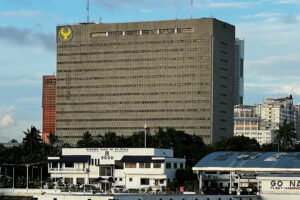




Philippines Trade Update: Trade trajectories trend along
 DOWNLOAD
DOWNLOAD

Policy Rate Updates: Double cut finale
 DOWNLOAD
DOWNLOAD

Monthly Economic Update: One for the road
 DOWNLOAD
DOWNLOAD


BSP has room for more RRR cuts

The Bangko Sentral ng Pilipinas (BSP) has room to cut lenders’ reserve requirement ratios (RRR) further, but is looking to further study the impact of lower levels on financial intermediation, its top official said.
“We’ve lowered our reserve requirements quite a bit. I think there’s room to lower them some more, but we have to time it right. But we need good research on exactly what the impact of reserve requirements are on financial intermediation,” Mr. Remolona said at a press briefing on Wednesday.
The BSP chief earlier said they were looking to further reduce banks’ RRR “when the time is right,” possibly as early as this year.
The RRR is the percentage of bank deposits and deposit substitute liabilities that banks cannot lend out and must set aside in deposits with the BSP.
In June last year, the BSP slashed the RRR for big banks and nonbank financial institutions with quasi-banking functions by 250 basis points to 9.5%. The central bank has brought down the RRR for universal and commercial banks to a single-digit level from a high of 20% in 2018.
“We traditionally looked at reserve requirements as a way to control money supply and that was the thinking in the 1960s, I think,” Mr. Remolona said.
“That thinking has gone away. Now, reserve requirements are seen as a distortion of financial intermediation. They drive a wedge between deposit rates and lending rates,” he added.
The BSP chief said intermediation is “burdened” by regulations, including reserve requirements.
“There is a gray market where conglomerates lend to each other — no big contracts — and so we want to bring that activity back into the formal banking system. But that needs more research. I’ve told you that I want to deepen the capital markets. We need research on that,” Mr. Remolona said.
RICE INFLATION
Meanwhile, the BSP chief also highlighted the need to monitor rice inflation.
“In our research, rice prices are what we call salient prices. They have a disproportionate impact on expectations beyond their weight in the consumer price index,” he said. “Because of that, we have to monitor mainly rice prices… There are other commodities affected by El Niño, but rice prices are so dependent on water. We have to monitor their effect on expectations.”
“We’re not going to do monetary policy on rice prices directly, but the second-round effects will affect our monetary policy,” Mr. Remolona added.
Headline inflation accelerated for the first time in five months to 3.4% in February amid elevated food prices, the government earlier reported.
Rice inflation, which accounts for almost half of the headline print, surged to 23.7% in February, or the fastest since the same month in 2009.
The BSP earlier said headline inflation could accelerate above their 2-4% target anew in the second quarter due to the El Niño phenomenon’s impact on agricultural production. — L.M.J.C. Jocson
This article originally appeared on bworldonline.com





 By BusinessWorld
By BusinessWorld